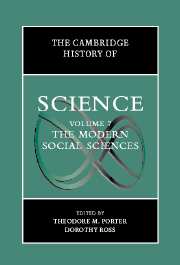Book contents
- Frontmatter
- 1 Introduction: Writing the History of Social Science
- PART I SCIENCES OF THE SOCIAL TO THE LATE NINETEENTH CENTURY
- PART II THE DISCIPLINES IN WESTERN EUROPE AND NORTH AMERICA SINCE ABOUT 1880
- PART III THE INTERNATIONALIZATION OF THE SOCIAL SCIENCES
- 22 The Sciences of Modernity in a Disparate World
- 23 The Social Sciences in Latin America during the Twentieth Century
- 24 Psychology in Russia and Central and Eastern Europe
- 25 Sociology in Egypt and Morocco
- 26 The Social Sciences in Africa
- 27 The Social Sciences in India
- 28 The Social Sciences In China
- 29 The Social Sciences in Japan
- PART IV SOCIAL SCIENCE AS DISCOURSE AND PRACTICE IN PUBLIC AND PRIVATE LIFE
- Index
- References
26 - The Social Sciences in Africa
from PART III - THE INTERNATIONALIZATION OF THE SOCIAL SCIENCES
Published online by Cambridge University Press: 28 March 2008
- Frontmatter
- 1 Introduction: Writing the History of Social Science
- PART I SCIENCES OF THE SOCIAL TO THE LATE NINETEENTH CENTURY
- PART II THE DISCIPLINES IN WESTERN EUROPE AND NORTH AMERICA SINCE ABOUT 1880
- PART III THE INTERNATIONALIZATION OF THE SOCIAL SCIENCES
- 22 The Sciences of Modernity in a Disparate World
- 23 The Social Sciences in Latin America during the Twentieth Century
- 24 Psychology in Russia and Central and Eastern Europe
- 25 Sociology in Egypt and Morocco
- 26 The Social Sciences in Africa
- 27 The Social Sciences in India
- 28 The Social Sciences In China
- 29 The Social Sciences in Japan
- PART IV SOCIAL SCIENCE AS DISCOURSE AND PRACTICE IN PUBLIC AND PRIVATE LIFE
- Index
- References
Summary
Since European explorers first began studying Africa, the continent has served as a testing ground for theories central to the development of science generally and of social theory in particular. Research conducted by sociocultural anthropologists, economists, and political scientists in Africa has generated concepts and theories of great importance to the disciplines. The impact of the social sciences on Africa has been equally far-reaching. Policy makers and development planners have tried to employ the social sciences as a means of bringing about social transformation since the colonial days. The development of the social science disciplines by Africans – the subject of this chapter – has been crucially shaped by all these efforts.
Writers on the social sciences in Africa can be divided into two polemical camps. The first is made up of Afrocentric scholars who are preoccupied with correcting unequal power relations in knowledge production. They try to show that there are other ways of knowing than those taught by conventional science. They also try to expose the exclusion of African knowledge systems from university curricula and the history of science, as well as the marginalization of African scholarship in the global academic community. The other side downplays the significance of these power relations and advocates a universal system of scientific knowledge production, one that includes an African role. Lacking a common language, the two camps effectively talk at cross purposes and are engaged in polemical nondialogue. Rather than taking a position in this debate, I will discuss features of the social sciences in Africa that both sides must take into account.
- Type
- Chapter
- Information
- The Cambridge History of Science , pp. 466 - 481Publisher: Cambridge University PressPrint publication year: 2003
References
- 1
- Cited by



